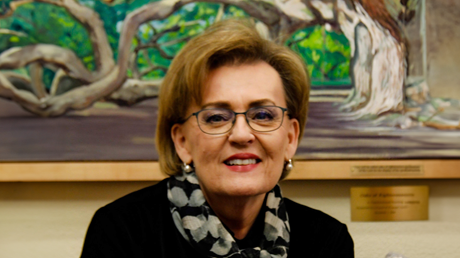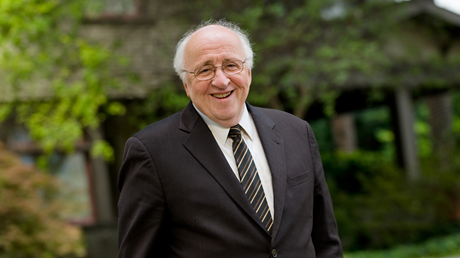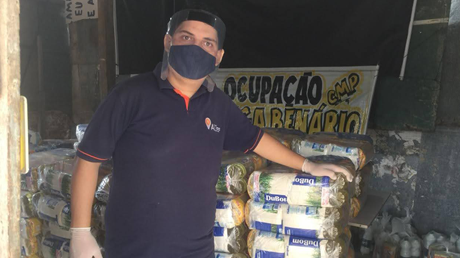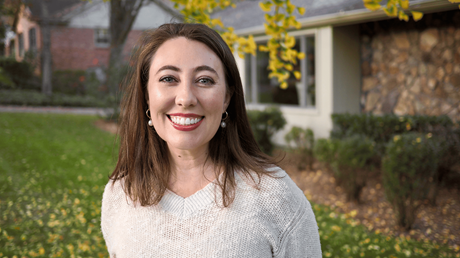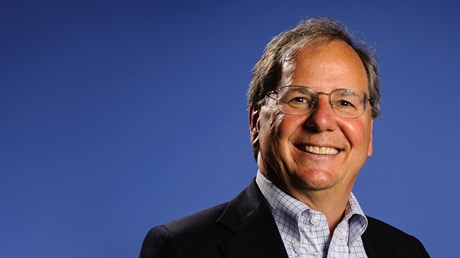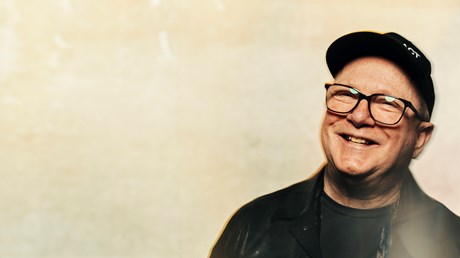
Will you help encourage and connect the church?
Give NowWill you help encourage and connect the church?
Give NowElisabeth Armstrong grew up in a family of spiritual giants. Her parents and grandparents were living examples of God’s love and grace—people who had devoted their lives to beautiful and authentic faith. She also was homeschooled and attended a Christian private school, which helped solidify her foundation.
But growing up in the late ’90s and early ’00s with “purity culture” in full swing was confusing. While she was deeply passionate about God and the church, Elisabeth never felt the prescriptions she was hearing—how women should show up in the church, with their families, or in the workplace—resonate.
“I never fit into that box, and I felt so ‘othered’ by the messaging I was hearing in the church,” Elisabeth lamented. “That was tough because I knew I was the way God created me to be, but I didn’t know how I was supposed to fit in.”
Elisabeth is grateful for the way theology was poured into her life, but even with this firm foundation, she still felt lost in church culture.
“I didn’t have the maturity yet to separate how church culture was different from my faith journey or what’s biblical,” Elisabeth recalled. “They may overlap, but they aren’t the same thing.”
In 2015, Elisabeth started working as a journalist. It was an exciting time: Being on the morning shift, there were many fun and joyful stories to tell. However, Elisabeth was more often covering elections or politics—which she saw dividing communities and the country: “I observed the perception of local journalists go from being trusted members of the community to being painted as its enemies. We were often harassed by people from both sides of the aisle who believed we were biased or pushing an agenda.”
She also found herself present for the worst moments of society: mass shootings, crime, abuse, and poverty. As she worked to make sense of what she was seeing, she experienced churches not addressing the issues. “Both churches and church members were often talking about these issues in a really dehumanizing way,” she said. “And I was out interviewing folks who truly needed hope and healing. I needed it myself.”
Elisabeth moved around a lot—three new cities in as many years—which made it hard to be integrated into a church community. She began to feel disconnected. “I felt as though I really didn’t have any faith at that point,” Elisabeth stated. “Despite having this beautiful foundation, I was overwhelmed by my disappointment at how the church showed up in those moments…It was hard for me. I started living in unhealthy ways and stopped investing in my relationships. I wasn’t treating myself or others very well.”
Around this time, Elisabeth returned to Denver and joined Wellspring Church. Wellspring nurtured her as she rediscovered her faith and explored what it meant to live with integrity as a Christian, and it helped her to find a place within the community.
When she stumbled onto CT’s The Rise and Fall of Mars Hill podcast, Elisabeth found more restoration: nuanced conversations around topics she had been exploring since her youth. She realized that beyond her church, there were cultural beacons advising Christians to ask questions and have difficult conversations about important topics.
“I feel like that podcast and having Christianity Today—which is a sort of lighthouse of Christian culture saying, We really need to scrutinize and consider what went on here and what went wrong, particularly when it came to things like gender and marriage, which are so foundational to both the church and God’s plans for how he created us—it was so massive for me.”
The Rise and Fall of Mars Hill gave Elisabeth a path for scrutinizing her history with the church, a cathartic process for her. She realized she wanted that healing process for her friends and even for people she didn’t know who might have had similar experiences. She started donating to Christianity Today so other people her age could have resources to guide them through their questions of faith.
“CT has had a massive influence on my faith in terms of expanding the belief that we aren’t always perfect as a church, we aren’t always going to get it right. There is nuance involved, but God calls us to assess rot in the church, to celebrate beauty, to be wise and discerning,” Elisabeth said. “It made me feel like I could rejoin the capital-C church, not just the church where I went every Sunday.”
Elisabeth also was moving in a different career direction. While working as a journalist in Little Rock, Arkansas, she volunteered in the medical ICU at a university hospital. Elisabeth remembers how most people recovering in the ICU were alone because their loved ones couldn’t get off work or didn’t have the gas money to travel to the hospital.
She gained new eyes for the healthcare disparity across the country, noticing how her community grappled with different social determinants of health like air quality, food deserts, race, gender, language, and economic status. These issues and experiences drove her to study bioethics. She went back to school, earning multiple graduate degrees in medical ethics, drug development, and health policy.
“For me, within my faith journey, I think about how Jesus; wherever he went, would pray for people and then heal them,” Elisabeth said. “He would go to gatherings and teach, and people would be healed. It was a very tangible representation of what Jesus does in our hearts and what he does for us spiritually. It made me want to work in the space.”
After studying bioethics, Elisabeth began working for CommonSpirit Health, then for Meta Reality Labs on its brain-computer interface team, and at Eventide Asset Management as a bioethicist on its biotech team. But one of the best parts for Elisabeth was teaching at Colorado Christian University—which quickly became one of the greatest privileges of her life.
She teaches the capstone course for the premed track, meaning she works with seniors in their last semester. Most students have already had clinical or research experience and have seen firsthand what she discusses with them in the class. They understand how important it is for them to be able to address these issues—to develop a moral framework and a moral voice to advocate within their practices, as well as on a systems level.
Within the field of bioethics, “no one exactly has all the right answers,” Elisabeth said. “It’s very interdisciplinary, and people come to the table with different perspectives. My students have great thoughts, but it’s a journey of wisdom and discernment. So, as I am teaching, I also feel myself being taught by my students.”
For Elisabeth, recent Christianity Today articles often sit at the crux of bioethical issues as seen in the November 2023 cover story on immigration or the December 2023 cover story on embryos and embryo adoption. Elisabeth shared both stories with her students.
“These are really challenging issues,” Elisabeth said. “Having CT to bring into the classroom at a Christian college to give perspectives to parse through these challenging issues, in addition to academic literature, in addition to the Bible, in addition to our philosophical frameworks—it feels important.”
Elisabeth notes that on these types of issues, there can be firm lines drawn and picking sides as opposed to discussing the issues together. She hopes that everyone can instead deeply consider these issues, which she believes are at the heart of what it means to be human. And that’s what Elisabeth loves about CT: She believes that the articles in CT are an invitation to begin these conversations from a place of shared humanity.
“I’ve found CT can be a channel for framing bioethical topics,” Elisabeth said. “If I try to share a bioethics book, people aren’t always interested. But I can share CT articles with people of faith. They are more digestible, and it can start discussions.”
So many different aspects of CT’s coverage have played a pivotal role in Elisabeth’s life—from The Rise and Fall of Mars Hill and Next Gen media (such as content on TikTok) that helped her feel understood and a part of the church to articles on faith and work that have been instructive in how she thinks about vocation. Also, resources around Christian education, like the Christian College Guide and the Higher Education topic section, help her understand the direction in which Christian education is moving.
“I know how CT has met needs in my life,” Elisabeth praised. “It’s played a massive role in who I am and how my faith has turned out, so I feel an enormous amount of gratitude to the folks in administration and the writers at CT. It’s so crazy to me that all these people who I have never met played this role in my life. I am sure there are hundreds, if not thousands, of people like me, who have been similarly blessed by CT.”


